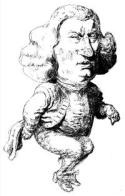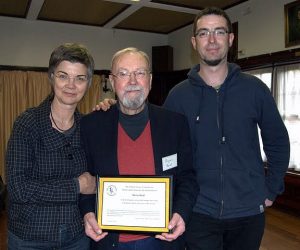The new formula for the annual seminar program is here to stay, following an enthusiastic reception from a large attendance at the 2010 seminar held at the English Speaking Union on July 24.
The program started later in the morning, but offered a more varied menu, with only three full-length presentations (40-50 minutes), punctuated by five “stub” papers or readings of 10 to 15 minutes each.
Prof. Wallace Kirsop talked about “Boulard the Bibliomaniac and Johnson’s Rambler” introduced us to the French lawyer, translator and book collector (1754-1825) whose huge collection comprised moire than 500,000 books. Unlike some obsessive collectors, Boulard also read as many of his books as he could, and translated foreign literature into English, including a number of Johnson’s work.
Nicholas Hudson (the Australian lexicographer, not the Canadian scholar), giving his twelfth seminar presentation to the JSA, pursued – as usual – a fascinating theme in an original manner. We know what it’s like in the twenty-first century to read Samuel Johnson: what could it have been it been like for Johnson to read the prose of our own time? By some good fortune, Johnson obtained an issue of the Melbourne Age newspaper, and conveyed to Nick his impressions.
Paul Tankard, who has been preparing an edition of Boswell’s journalism for Yale University Press, spoke about “James Boswell, Newspaperman,” describing the range of Boswell’s contributions to the press, and the experience of gathering, editing and annotating such items. He also described some of the themes of the 131 pieces selected for his edition.
The “stub” papers enabled presenters to explore interesting themes, without the need for the detail and elaboration that a full-length paper would require. The readings were a great means by which to fulfil the “enjoyment” aspect of our JSA charter, which stresses our aim to “study and enjoy” Johnson.
Dr. Kate Burridge used Johnson’s Dictionary as the departure point for the consideration of 18th-century insults, in particular, slubberdegullion and nincompoop, and speculated on what makes an insult retain or lose its currency over time.
The president of the JSA, Barrie Sheppard, read and commented upon passages from three of Johnson’s letters to the young Hester Maria (“Queeney”) Thrale.
Barbara Niven, the Society’s secretary, introduced a recording of an opera by J-J. Rousseau, which accompanied our chat over lunch.
Bronwen Hickman gave a lovely reading of sensitively-selected passages from Hester Piozzi’s Anecdotes of Johnson, which as she showed gives a more private and gentle side than Boswell does of the great Cham of literature.’
Finally, John Byrne, who spent most of 2009 globe-trotting in relation to his Johnson tercentenary duties, brought along an array of recently-acquired Johnsonian artifacts, including medals and suchlike, and a booklet published by Johnson’s father.


